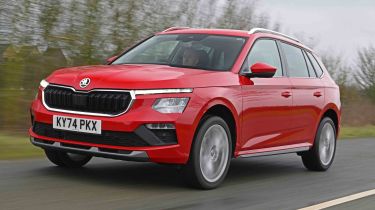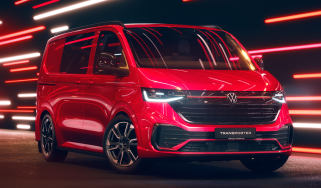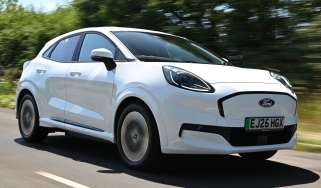Skoda Kamiq review
We appreciate the mid-life enhancements that have improved the Kamiq’s already impressive package of practicality, quality and comfort

Our opinion on the Skoda Kamiq
The Kamiq is the most affordable way into one of Skoda’s tried and trusted SUV models. True to form for the Czech brand, it’s comfortable and well-built with a reassuringly simple design and smart technology.
Our testing of all the engine options confirms there’s not a bad one amongst them but the automatic gearbox isn’t the smoothest and there’s none of the fancy fuel-saving hybrid tech that some rivals employ. Overall, the Kamiq is a solid, user-friendly small SUV that only really lacks a bit of sparkle in the design department.
About the Skoda Kamiq
Skoda has a comprehensive family of SUV options, including a full-size seven-seater, the Skoda Kodiaq, the more compact Skoda Karoq and the fully electric Skoda Enyaq and Skoda Elroq. The Skoda Kamiq sits at the bottom end of the group, in terms of both size and price.
Under the skin, the Kamiq sits on an enlarged version of the MQB-A0 platform that also underpins superminis such as the Volkswagen Polo and the brand's own Skoda Fabia. Within the VW Group, the Kamiq’s closest equivalents are the Volkswagen T-Cross and the SEAT Arona.
There’s just one five-door body style available with this small (B-segment) SUV, and all versions of the Kamiq are front-wheel drive - there’s no four-wheel drive option available.
A 2025 update brought in upgraded infotainment technology and a dual-screen dashboard to modernise the car’s somewhat basic interior. There were also tweaks to the trim level range.
Skoda Kamiq prices and latest deals
Base Kamiq models start below £25,000 and in 2025 a revised trim structure improved the levels of standard kit throughout the range.
Used - available now

2023 Skoda
Kamiq
2,671 milesAutomaticPetrol1.0L
Cash £18,000
2023 Skoda
Kamiq
26,584 milesManualPetrol1.0L
Cash £15,100
2023 Skoda
Kamiq
26,206 milesManualPetrol1.0L
Cash £13,999
2022 Skoda
Kamiq
26,641 milesAutomaticPetrol1.0L
Cash £15,217- SE Edition (from £25,000)
- Design Edition (from £26,000)
- SE L Edition (from £28,000)
- Monte Carlo Edition (from £30,000)
Our Buy A Car service lets you spec your ideal Skoda Kamiq and choose the best offer from top dealers around the UK. Alternatively, you can lease a Kamiq or buy a used model. We can help you sell your old car, too.
Performance & driving experience
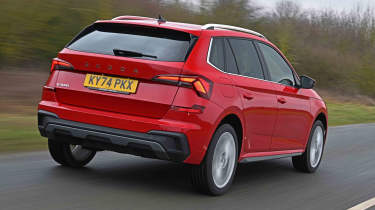
Pros |
|
Cons |
|
Access to the VW Group’s technology has enabled Skoda to offer a range of three tried-and-tested petrol engine options in the Kamiq, although hybrid fans will have to look elsewhere and there’s now no diesel.
The six-speed manual gearboxes have a light and slick shifting action, while the dual-clutch automatics are particularly responsive. Our one criticism of the auto is that it can be a little hesitant and jerky when moving off from rest. This makes precise, low-speed manoeuvres such as parking a little trickier than they should be.
The Kamiq is not a car that will set hearts racing, but our testing has showed that the road manners tick all of the main boxes required of a small SUV. Skoda’s effort generally ranks towards the top of its class in most areas from a driving perspective.
Performance, 0-60mph acceleration and top speed
The engine range kicks off with the 1.0-litre three-cylinder TSI unit, which offers 94bhp and 175Nm of torque, but if you can stretch your budget to the version with 114bhp and 200Nm, we recommend doing so.
The 1.0 TSI in 94bhp guise is capable of 0-62mph in 11 seconds, while the torque spread from low revs is useful for keeping pace with urban traffic. We think the 114bhp version is a lot more flexible, however. It can sprint from 0-62mph in 9.7 seconds, although adding the DSG auto sees that time grow to 10.2 seconds. Auto or manual, there’s a 121mph top speed compared to 113mph in the 94bhp car. .
Above the 1.0-litre options sits a more potent 1.5-litre unit. This gains a cylinder and an extra 34bhp and 50Nm of torque over the mid-range 1.0 TSI, which makes a lot of difference in a car that weighs a fairly modest 1,277 to 1,289kg.
A 0-62mph time of 8.3 seconds means that there’s more than enough power for everyday driving and longer journeys, while the car’s top speed is 132mph. The DSG auto has the same 0-62mph time as the manual model. Most buyers in the small SUV class probably don’t need the extra power but if you do a lot of miles or regularly carry a full complement of passengers or luggage, the upgrade could be worthwhile.
All the engines are very quiet for small petrol units. The 1.0-litre’s three-cylinder layout transmits subtle vibrations into the cabin, but its engine note always remains low-key. The 1.5 unit sounds a little more eager to rev and is smoother under hard acceleration, remaining refined even when it’s being worked hard.
| Model | Power | 0-62mph | Top speed |
| Kamiq 1.0 TSI 95PS | 94bhp | 11.0 seconds | 113mph |
| Kamiq 1.0 TSI 116PS | 114bhp | 9.7 seconds | 121mph |
| Kamiq 1.0 TSI 116PS DSG | 114bhp | 10.2 seconds | 121mph |
| Kamiq 1.5 TSI 150PS | 148bhp | 8.3 seconds | 132mph |
Town driving, visibility and parking
The Kamiq’s steering is light yet precise. Combined with dimensions that aren’t much larger than a supermini’s, this helps make it very easy to drive around town. We found that the brakes take a little time to acclimatise to, because they are quite sharp at the top of their travel, but they feel strong.
Ride comfort at low speeds is, in general, among the best in the class. Aside from larger potholes, which can cause bigger thuds in the cabin than in rivals such as the Jeep Avenger, the Kamiq remains a comfortable way of getting around town.
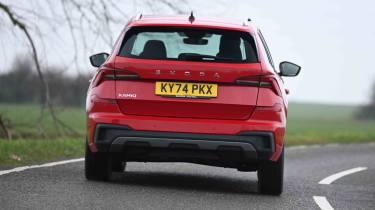
Country road driving and handling
There are very few cars in the small SUV segment – Ford’s Puma being one of the exceptions – that are actually fun to drive. But the accuracy of all the Kamiq’s major controls – plus the strong performance of its most potent petrol option – mean that it’s better than most in that regard.
The car has a very subtle, nose-heavy bias, the grip is strong and it feels reasonably light on its feet when you need it to change direction quickly. The suspension’s overall softness allows the driver to have a strong idea of just how much grip is available, and it’s easy to cover ground smoothly. The suspension keeps the car on course well, even when it hits a sudden mid-corner lump.
Motorway driving and long-distance comfort
Despite it being a relatively small car, the Kamiq’s ride is at its best on the more settled surface of a motorway. On our tests, the overall softness managed to soak up longer compressions with ease and fade expansion joints into the background. Stability is great at speed, while road and wind noise are fairly well isolated compared with other cars in the class.
“Ride comfort and handling are above average for the class, refinement is fine and the engine range is strong, whether you want a manual or an automatic gearbox.” - Alex Ingram, chief reviewer.
MPG & running costs
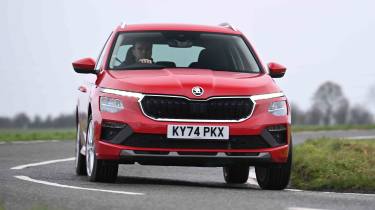
Pros |
|
Cons |
|
Officially, the Kamiq’s 1.0-litre petrol achieves up to 52mpg in WLTP tests. If you upgrade to the 114bhp version, as we recommend, you actually gain 0.4mpg. The larger 1.5 can return up to 49.1mpg and our experience in the real world suggests that there isn’t much difference between any of the engines in terms of efficiency.
During our last encounter with the 1.0-litre smaller unit in manual form, we achieved 45.3mpg, while the 1.5 TSI managed 43.8mpg. The Kamiq’s 1.0-litre engine tends to be more frugal with that manual gearbox with the auto struggling to get into the mid-thirties for mpg around town. That aside, the Kamiq’s real-world economy is excellent; even on motorway runs in the 1.5 TSI can deliver 50-52mpg, while the 1.0-litre gets into the mid-fifties.
| Model | MPG | CO2 | Insurance group |
| Kamiq 1.0 TSI 95PS | 52.0mpg | 123g/km | 12 |
| Kamiq 1.0 TSI 116PS | 52.4mpg | 122g/km | 15 |
| Kamiq 1.0 TSI 116PS DSG | 50.7mpg | 126g/km | 14 |
| Kamiq 1.5 TSI 150PS | 48.3mpg | 132g/km | 14 |
| Kamiq 1.5 TSI 150PS DSG | 49.1mpg | 130g/km | 20 |
Insurance groups
The Skoda Kamiq ranges between group 12 for the least powerful 94bhp 1.0 TSI, up to group 20 for the 148bhp 1.5-litre. That’s on a par with the Volkswagen T-Cross (groups 11-20), but is generally higher than the Ford Puma (groups 12-17), Renault Captur (groups eight to 19) and Toyota Yaris Cross (groups 11-14).
Tax
For drivers paying Benefit-in-Kind (BiK) company car tax, the combustion-powered Kamiq will command far higher rates than its fully electric competitors. If you still want a Skoda SUV but want to save some extra pennies, we recommend taking a look at the Skoda Elroq, our 2025 Car of the Year.
Along with the Elroq, there are a number of other models such as the Kia EV3, Jeep Avenger, Peugeot E-2008 and Vauxhall Mokka Electric to consider.
Depreciation
Depending on the trim and engine combination, the Kamiq is predicted to hold on to between 47 to 50 per cent of its original price after three years or 36,000 miles.
The Volkswagen T-Cross fares similarly to that across most of its range, while the Renault Captur is better; it is expected to cling on to 51 to 55 per cent of its original value. A Jeep Avenger loses more money, maintaining around 40 to 43 per cent of its original purchase cost – or a little less than that if you choose the fully electric version.
To get an accurate valuation for a specific model, check out our free car valuation tool...
Interior, design & technology
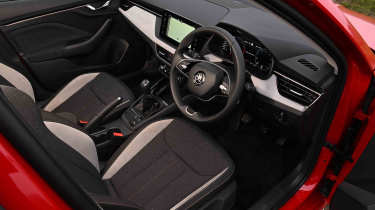
Pros |
|
Cons |
|
As part of an update in 2025, the Skoda Kamiq received new infotainment tech and a dual-screen dashboard to help keep things feeling up to date inside. Aside from this, though, the Skoda’s cabin feels pleasingly simple and straightforward, with a focus placed on usability rather than flashy design.
The Kamiq’s interior is starting to feel a tad dated compared to some of its younger small SUV rivals/ On the flipside, an abundance of traditional switchgear will be a huge relief for more buyers who, like us, get annoyed with basic controls being buried in touchscreen menus.
All Kamiq models get LED headlights, a rear-view camera, a 10.25” Virtual Cockpit driver’s display and satellite navigation in the 9.2” touchscreen display.
The Design Edition adds sports seats, a sports steering wheel and black details on the outside. SE L Edition piles on more tech with keyless entry and start, parking sensors all round, heated seats and larger 18” wheels. The Monte Carlo Edition is semi-sporty with matrix LED headlights, a panoramic roof and adaptive cruise control.
Interior and dashboard design
The first thing that strikes you about the Kamiq’s cabin is that it has actual physical controls. The climate functions are operated using dials and chunky buttons; the light switch is a big dial beside the steering wheel, which rotates with a satisfying clunk. There’s even a manual handbrake, too. With so many rivals putting controls like these into their touchscreens, we find driving the Kamiq a refreshingly old-school experience in comparison. Despite this now-rare use of buttons, the overall look is clean and understated..
Materials and build quality
Soft-touch plastics are not exactly commonplace in supermini-based SUVs and there’s lots of hard plastic in the Kamiq. At least it feels sturdy enough, helped by the fact that the main touchpoints, such as the door handles and steering wheel, feel expensive and high class.
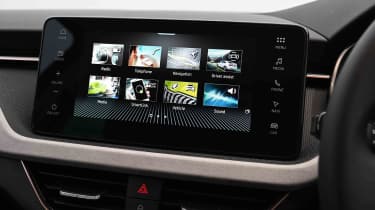
Infotainment, sat-nav and stereo
All Kamiqs are fitted as standard with Skoda’s digital cockpit technology. It’s a digital driver information display on a 10.25-inch screen that offers plenty of scope for customisation. You can set different display layouts to prioritise mapping, speed, driver assist functions or go for a more minimal look.
Whichever display is selected, the white-on-black graphics with green highlights are sharp and the information is presented clearly. The combination of buttons and thumb wheels on the steering wheel makes changing between modes easy and intuitive.
The Kamiq’s infotainment system is a prime example of how not to overcomplicate simple things. Keeping the climate controls separate helps massively, but so does a logical menu structure. Screen resolution is sharp, the graphics are consistent through the menus and with the digital driver’s display, while the panel responds quickly to touch inputs. The volume can be adjusted by a wheel on the steering wheel.
One minus point is Skoda’s smartphone connectivity. In comparison with Ford Bluetooth systems, which just instantly work, connecting a device wirelessly to the Kamiq’s set-up always seems like a struggle, with the system usually taking a few attempts to connect successfully.
Even then, Android Auto can take minutes to pair automatically, although you can speed things up by manually selecting the option yourself. But you’ll still need a USB cable anyway, because there’s no wireless charging.
“Overall, the Kamiq’s interior has a mature and high-quality feel to it. We particularly like the addition of the fabric dashboard to help create more of a living-room aesthetic.” - Ellis Hyde, news reporter.
Boot space & practicality
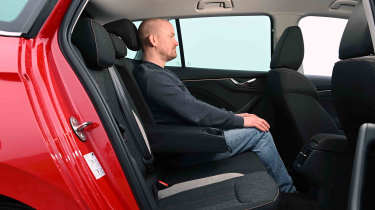
Pros |
|
Cons |
|
For a car barely larger than a supermini, Skoda’s designers have managed to unearth an awful lot of space inside the Kamiq’s cabin.
Skoda’s Simply Clever Plus pack (£340) adds extras that make life easier throughout the Kamiq. Rear-seat passengers each get a tablet PC mount on the back of the front seats, while loading the kids in and out of tight spots becomes a little less stressful thanks to pop-out door edge protectors.
Further forward, the pack adds a small waste bin in the driver’s door pocket and drawers under the front seats. The boot gets a net on the underside of the parcel shelf and a double-sided floor; one side is rubber and the other is carpet.
Dimensions and size
At just over 4.2m long and almost 1.8m wide, the Kamiq isn’t a particularly big car, but it’s marginally larger in both directions than a Volkswagen T-Cross, and slightly longer than a Nissan Juke. It’s more like a high-riding medium/small hatch, almost as if the Skoda Scala had been given a lift kit.
| Dimensions comparison | |||
| Model | Skoda Kamiq | VW T-Cross | Nissan Juke |
| Length | 4,241mm | 4,127mm | 4,210mm |
| Width | 1,793mm (1,988mm inc mirrors) | 1,760mm (1,993mm inc mirrors | 1,800mm (1,983mm inc mirrors) |
| Height | 1,531mm (1,559mm inc roof rails) | 1,573mm (1,584mm inc roof rails) | 1,593mm |
| Wheelbase | 2,651mm | 2,551mm | 2,636mm |
| Boot space | 400-1,395 litres | 455-1,281 litres | 422-1,305 litres |
Seats & passenger space
Much as with every other Volkswagen Group product, it’s easy to find a comfortable driving position in the Kamiq, thanks to the driver’s seat and steering wheel offering a huge range of adjustment.
A large tray at the base of the dashboard has plenty of space to hold a smartphone, while a modular storage item slots into one of the two cup-holders in the centre console, which is ideal for taking care of the key on the move. The large door bins are useful, too.
There’s loads of space in the back. The Kamiq easily beating rivals such as the Peugeot 2008, Jeep Avenger or Ford Puma. Headroom, in particular, is excellent for a car in this class, but kneeroom is also among the best the segment has to offer.
The seats themselves are fairly soft and supportive – even in the centre seat, which can often be a little overlooked – and large plastic openings make it easy to access the Isofix points when installing a child seat.
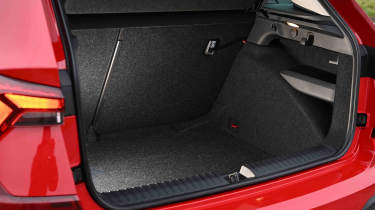
Boot space
For a car of this size, the 400-litre boot is decent. It’s not quite the largest in its class – the Nissan Juke, for example, has 422 litres of space – but the Skoda’s wide opening, square shape and high roofline make it a useful area. Drop down the rear seats, and that volume grows to an impressive 1,395 litres.
A variable boot floor is a £205 option that’s well worth the investment. Without it, there’s quite a drop beyond the opening, which makes it a little more tricky to lift heavy items into position, and once the seats are folded, it creates a useful flat load-through area. If you’re willing to sacrifice just a little more storage capacity, then a space-saver spare wheel is offered as an option.
“Rear passengers have room to spare, particularly when it comes to headroom, plus space under the front seats for their feet. Two adults would be very comfortable back there.“ - Ellis Hyde, news reporter.
Reliability & safety
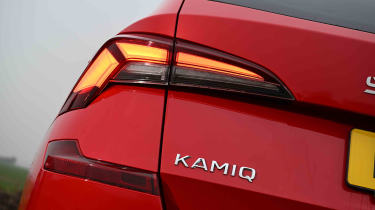
Pros |
|
Cons |
|
Skoda finished a pretty mediocre 13th out of 31 brands in the best car manufacturer rankings of our 2025 Driver Power survey. This is rather disappointing, given that owners used to speak very highly of their cars, meaning the Czech firm regularly placed within the top five only a few years ago.
The Kamiq was awarded a full five-star rating from Euro NCAP when it was originally tested in 2019, with a stellar 96 per cent score for adult occupant safety. It scored 85, 80 and 76 per cent in the Child Occupant, Vulnerable Road Users and Safety Assist categories, respectively. The closely related Volkswagen T-Cross recorded higher safety scores, beating the Kamiq by a few per cent in each category. It’s a shame that Skoda charges extra for a driver’s knee airbag and rear side airbags, though, and they’re part of a pack, too, costing around £700.
| Euro NCAP safety ratings | |
| Euro NCAP safety rating | 5 stars |
| Adult occupant protection | 96% |
| Child occupant protection | 85% |
| Vulnerable road user protection | 80% |
| Safety assist | 76% |
Buying and owning
Best buy: Skoda Kamiq SE L Edition 1.0 TSI 116 PS
If you’re prepared to fork out a few extra pounds, we think the SE L Edition trim adds the necessary extra kit to make this small SUV into a more premium and convenient offering . Keyless entry and start, heated seats and all-round parking sensors are useful touches.
The more powerful 1.0-litre TSI engine offers ample power and respectable refinement without guzzling fuel. So running costs won’t be too alarming.
Alternatives
Since the Kamiq is based on the Volkswagen Group’s tried-and-tested MQB platform, it’s obvious that its main rivals are going to be the platform-sharing Volkswagen T-Cross and Volkswagen Taigo, plus the SEAT Arona. It’s positioned a little higher than those models on price, but it’s also slightly larger, so you’re getting more car for the money.
The small SUV market has a lot of contenders. There’s the funky and soft-riding Citroen C3 Aircross, quirky Nissan Juke, fun-to-drive Ford Puma and the well-rounded Renault Captur. These all have varying levels of hybrid assistance (as well as all-electric options). Other models offered with hybrid drive include the Hyundai Kona and Toyota Yaris Cross, while cars such as the Jeep Avenger, Peugeot 2008 and Vauxhall Mokka have petrol, hybrid and fully electric variants.
Deals on the Skoda Kamiq and alternatives
Skoda Kamiq
Nissan Juke
Volkswagen T-Cross
Skoda Kamiq pictures
Frequently Asked Questions
You can deactivate it by pressing a button on the steering wheel. Simply select the one with the car icon surrounded by a circle, then scroll to the speed limit detection option and turn it off. You’ll have to do this before every drive, though.

